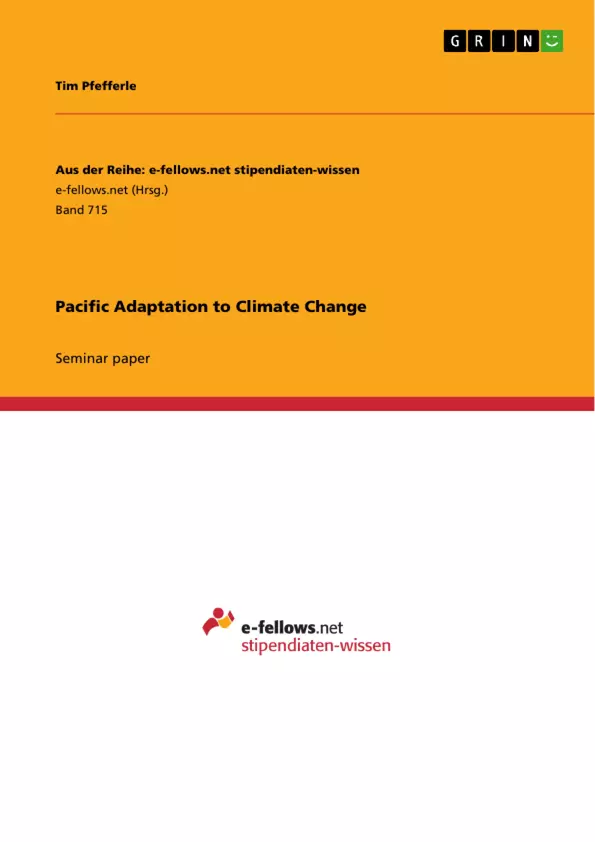This works sets out to place climate change in the context of its contemporary consequences by reference to the Pacific Adaptation to Climate Change program (PACC). This is important because, contrary to conventional discourse, complications and damages caused by climate change have already started to materialize. The PACC program will thus be outlined against the backdrop of this particular condition.
There will be a description of PACC’s intended outcomes as well as of its stated priorities, which will both be related to the countries’ problems vis-à-vis climate change. Moreover, the funding mechanism underlying PACC will be delineated, providing an indication in terms of the United States’ financial involvement.
The theoretical framework employed to situate PACC from the perspective of the United States will focus on a three-dimensional approach featuring diplomacy, security and humanitarian concerns, which all have interlocking implications. Since the PACC countries do not constitute a significant economic region, commercial imperatives were discarded. However, it is apparent that the PACC program could function as a pilot project in terms of improving climate change resilience, which may then be applied elsewhere. Therefore, it may have a wider significance with regard to the relationship between climate change and development.
Inhaltsverzeichnis (Table of Contents)
- Introduction
- Background and History
- PACC's Core Mechanism, Funding, and Objectives
- The US Role in PACC
- Conclusion
Zielsetzung und Themenschwerpunkte (Objectives and Key Themes)
This work aims to explore the Pacific Adaptation to Climate Change program (PACC) and its relevance in addressing the immediate consequences of climate change in the South Pacific region. It delves into the program's objectives, priorities, and funding mechanisms, highlighting the United States' role within this initiative. The analysis is framed using a three-dimensional approach, encompassing diplomacy, security, and humanitarian concerns.
- The impact of climate change on South Pacific island nations.
- The objectives and priorities of the PACC program.
- The funding mechanism and financial involvement of the United States.
- The role of diplomacy, security, and humanitarian concerns in the US approach to PACC.
- The significance of PACC as a potential pilot project for improving climate change resilience.
Zusammenfassung der Kapitel (Chapter Summaries)
- Introduction: This chapter introduces the pressing issue of climate change and its impact on island nations, specifically focusing on the South Pacific region. It highlights the importance of the Pacific Adaptation to Climate Change program (PACC) in addressing these challenges.
- Background and History: This chapter delves into the vulnerability of South Pacific island nations to climate change, outlining factors such as sea-level rise, extreme weather events, and limited adaptive capacity. It traces the development of the PACC program, emphasizing its origins in the recognition of shared concerns by Pacific island leaders and its implementation through the United Nations Development Program (UNDP) and the Secretariat of the Pacific Regional Environment Program (SPREP).
- PACC's Core Mechanism, Funding, and Objectives: This chapter examines the core mechanisms, objectives, and funding structure of the PACC program. It discusses the program's three principle outcomes: mainstreaming climate change considerations into development policies, implementing demonstration measures, and building a long-term framework for regional cooperation. It also outlines PACC's priorities, which include food security, coastal management, and water resources.
- The US Role in PACC: This chapter analyzes the United States' involvement in PACC, focusing on its role within a theoretical framework incorporating diplomacy, security, and humanitarian considerations. It examines the underlying factors driving US participation in the project and its potential implications.
Schlüsselwörter (Keywords)
The keywords for this work include climate change, Pacific Adaptation to Climate Change program (PACC), South Pacific island nations, vulnerability, sea-level rise, extreme events, adaptive capacity, diplomacy, security, humanitarianism, United States, funding mechanisms, development policies, regional cooperation, food security, coastal management, water resources.
Frequently Asked Questions
What is the Pacific Adaptation to Climate Change (PACC) program?
PACC is a regional program designed to improve the resilience of South Pacific island nations against the immediate consequences of climate change, such as sea-level rise.
What are the core priorities of PACC?
The program focuses on three key areas: food security, coastal management, and the protection of water resources in vulnerable island communities.
What is the United States' role in PACC?
The U.S. involvement is analyzed through a lens of diplomacy, security, and humanitarian concerns, providing funding and strategic support to the region.
How is PACC funded?
Funding is provided through mechanisms involving international organizations like the UNDP and the Global Environment Facility, with significant contributions from donor countries.
Is PACC considered a pilot project?
Yes, the program functions as a pilot project for developing climate change resilience strategies that could potentially be applied to other developing regions globally.
- Quote paper
- Tim Pfefferle (Author), 2013, Pacific Adaptation to Climate Change , Munich, GRIN Verlag, https://www.grin.com/document/214290



